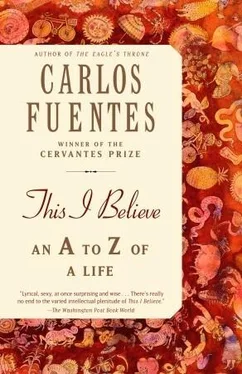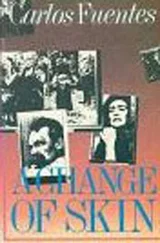Plato states that it is impossible to declare the universe eternal. But the Creator “resolved to bequeath us an image of eternity in motion. . and this is what we call time.” Time is the image of eternity when it moves. Eternity in movement is time. I never cease to marvel at this idea, which is an image. But whether I am impressed, consoled, or inspired by it, I can never find release from the contentious relationship I have — and in the end, everyone has — with time, because as I continue to pursue time, I scratch at it but can never grasp it fully. Born, nurtured, loved and being loved, yearning, aging, and ultimately dying in time, I will never know what I was before I was — the past without me — nor will I ever know what I will be when I no longer am — the future without me.
No matter how much we rationalize time, its realm, original and mortal, is the realm of mystery. I ask myself about the wisdom of God and the Devil and I tell myself it is a relationship with time. The Kabbalah says that nothing disappears entirely; everything is transformed. What we believe to be dead has only moved on to another place. Places remain. We don’t see them move on anywhere. And anyway, what is time if not our own measurement, invention, imagination? All that exists is thought. All that is thought, is. Times can move from place to place, they can join together or superimpose themselves upon each other and then they separate. We can travel from one time to another without moving from the space we inhabit. But if we travel from one time to another and don’t return to the present on time, we lose our memory of the past (if that is where we went) or our memory of the future (if that was the starting point). It is captured in the present. Life is in the present. And all of us, without exception, return to the present sooner or later. Time does not stop to wait for us as we travel back to the past or forward into the future. And we always arrive late. A minute or a century, it makes no difference. By now we cannot remember if we are living before or after the present. Perhaps our pact with time is to live in the present without memory of the most distant past or future, for the past and future that are closest to us are precisely what enable us to return to the present. There are times when we exchange enigmatic glances, on the street, in an airport, on a boat, in a department store, on a staircase, in an elevator, in a church, in a theater, in a cemetery, and we are asked: Who were you? Where did you live before? Where did you die before? Do we know each other?
If I wanted to rid myself of an intolerably sad memory, my pact with God or the Devil would be this: take away my memory and I’ll give you my soul. But not even God can reverse what has been done. The Devil, on the other hand, claims that he can reverse what was into what wasn’t. That is how God challenges and tempts man, for by forgetting an abominable fact, don’t we also risk forgetting the very best of our lives? Times that witnessed our parents’ love for us, a woman’s beauty, a man’s passion, a child’s pride, the joy of friendship, everything. That is the diabolical clause: forget everything or forget nothing.
I see a child and I tell myself that each person born might very well reincarnate another man who dies. If I want to know how some child’s face will look after forty years, all I need to do is go to the place where he will be baptized, named. There I will find him. There I will see the future face of that child. There I will tell myself that nobody can end his own life. No one is ever able to live fully all his possible time.
Who, then, are the immortals? There are beings who do not speak to us, but who look at us. They do not see us, but they remember us. They do not remember us, but they imagine us. Who, then, are the immortals? Those who lived a long time, those who reappear time after time, those who had more life than death, but less time than life.
I believe in cities. Nature makes me too anxious. The terror she inspires in me strikes me as nearer rather than dearer. I am seduced by natural beauty. I can spend hours flying above the white thrones of the Andes or the Rocky Mountains, in a state of virtual ecstasy. How I would love to lose myself in the delicate, everlasting beauty of a Russian birch forest! The Irish coast, that turbulent ocean fortress that defends an entire continent, takes my breath away. And I could bury myself forever and ever in the lime-green clarity of the Caribbean, transparent tomb of all the silver and gold of the ghost cities of Indian America. And is there anything quite as serene, undulating, and blessed with eternity in movement as those wheat fields that are waves, the green followed by the gray-brown, followed by the tremulous blue of the Palouse, in Idaho?
And then I hear the sardonic voice of Schopenhauer: “For once, try to fully be nature,” and then I emerge from my calendar dreams, my guilty rapture, my grudging separation from those people who so unconditionally revel in natural beauty. What is the intrinsic defect that prevents me from speaking with a true love of nature, desiring and desirable at the same time? For I admire nature, but I fear it as well. I envy it. All natural things and beings always seem to be in just the right place. We, as human beings, displace ourselves, we wish we could be something or somewhere else, we are always out of place, unlike the Colorado canyons or the waterfalls of the Zambezi River or the tigers of Bengal — that is, if there are any left in the world by now. Even migratory species fulfill cycles of eternal return that are comparable to the superlative beauty of the wild cherry tree as it comes into bloom time after time. Yes, we admire the order of natural beauty. But we know that behind its creation lies catastrophe. And we fear that the next catastrophe will not be the work of nature (with all the peril and convulsion she carries with her) but rather the hand of apocalypse, one that is worse than any earthquake or tidal wave: the final act of vengeance that human beings will perpetrate against nature. Today, for the first time, we possess the verifiable suspicion that we could die along with nature, at the very same moment. In times past, no matter what obstacle nature faced — stay here, abandon me — we always knew that nature would outlast us. The inevitable death of the human being has been accepted by a natural environment that, until now, has served as a consolation to us because it survives. Today, our own madness could orchestrate a simultaneous catastrophe. I die, and nature dies with me. Après nous, le néant. .
I have never believed that there exists an original bucolic Golden Age to which one day we shall return so that we may become as we were in those early times — that is to say, complete. The primeval Golden Age, Ovid’s very explicit dream that is expressed, almost verbatim, by Don Quixote with his goatherds:
Fortunate the age and fortunate the times called golden by the ancients, and not because gold, which in this our age of iron is so highly esteemed, could be found then with no effort, but because those who lived in that time did not know the two words thine and mine. In that blessed age all things were owned in common. . In that time all was peace, friendship, and harmony. . there was no fraud, deceit, or malice. .
It is a regressive dream, one that brings us back to the illusion of that which never was. All the virtues we have lost but yearn to recover, we attribute to nature. It is a revolutionary dream: one in which we turn back to our starting point in order to discover the promise of the future. This, in the end, becomes utopia’s desired incarnation, more than just a pretext reminiscent of origin. The return to nature is also the dream of the New World. America is invented (desired, discovered) by Europe so that in another part of the world, in an ideal là-bas, a perfect and natural society may be reborn — the very one that the Renaissance (More, Campanella, Bacon, Shakespeare, Cervantes) both dreamed of and denied. In Europe, it was denied by realpolitik, Machiavelli, the Borgias, and irresponsible power; the Fuggers and money with interest, Luther and the religious war with nationalism; Isabel, Ferdinand, and racial intolerance. The terrible Thirty Years’ War and its Mothers Courage dragging their bundles of rags and eating the scraps of their old illusions: with this image, Brecht ends the Renaissance.
Читать дальше












